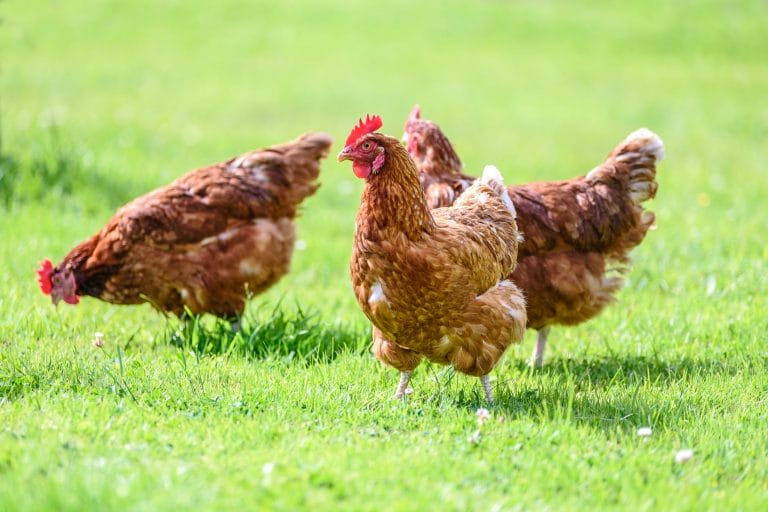This entry was posted on 13 April 2022 in Chicken Coops.
Your chicken coop is where your hens nest, sleep and shelter from the weather. To ensure the health and happiness of your feathered friends, your coop needs to include certain items. Let’s explore these further.
Items to include in a Chicken Coop:
Chickens like to be up high when they sleep, and a roosting perch provides them with a comfortable space to sleep, off the ground.
Did you know, that chickens are very sound sleepers – keeping themselves off the ground when they sleep provides extra security from predators.
Whilst it’s true that chickens will lay eggs regardless of whether they have a nesting box or not, without the box, eggs will be buried in straw around the coop, often ending up cracked or mislaid (not the best if you’ve invested in chickens to provide you with fresh eggs).
You don’t need a separate nest box for every chicken, (psst, you’ll be pleased to know we always list the approximate number of hens our coops and nest boxes are suitable for, making purchasing a breeze!) but you ensuring your coop has a dedicated space for your hens to lay eggs avoids issues around your hens eating their eggs.
Like every other pet, chickens need a fresh supply of food and water. Non-drip waterers should be used, keeping the coop free from spills and dampness that could lead to rot or uncomfortable conditions for your chickens.
Food and water can also be placed outside of the coop (providing the water won’t freeze in cold weather) to encourage your hens to explore outside.
Whilst chickens may be small in stature, they are mighty when it comes to fending off the cold. A chicken will trap a warm layer of air between their skin and their feathers to prevent them from getting cold. Whilst this works well and means a chicken can keep itself warm in cold temperatures, wind or draughts can disrupt the feathers, and, consequently, this warm pocket of air.
A coop should be well ventilated, but secure from high winds or draughts. Additional insulation isn’t always necessary, but if your birds are newly freed ex-battery, small bantams or frizzles, or you’re aware of high winds approaching, then you should take extra precautions. Give your birds additional bedding, and cover any open windows or runs with tarpaulin or a blanket, ensuring your coop can still get a source of fresh air and is not airtight. Note, stale air can cause illness in your birds.
Chickens can dust bathe inside and out of the coop, but if you’d like to provide a fortified dust bath, the best way to do this is by dedicating a corner of your coop to this activity.
Dust bathing is a natural behaviour for chickens and allows them to effectively clean themselves.
Various types of bedding can be used in a chicken coop, and as long as you’re not using toxic materials, such as pine shavings, it is largely down to personal choice.
Straw is one of the most common bedding materials, but if you’re looking for something with higher absorbency, you may opt for medium to coarse-grained sand.
Lighting in a chicken coop is not essential. Chickens will naturally produce fewer eggs in the winter as the daylight that stimulates the pituitary gland is reduced. Artificial lighting can keep the supply of eggs steady over the winter months, but there is no benefit to the chicken for including this.
It should be noted that if you decide to light your coop in the winter, you must be consistent. Suddenly removing the light, or forgetting to switch it on may make your hens go into moult.
We understand that whilst chickens are fairly low maintenance animals, if you’re new to chicken keeping, it can be a minefield. To make things simple, we always detail the number of birds our coops are suitable for, alongside their features and dimensions. On top of that, we’re always on hand to help! If you have any queries, call us today on 01273 978 487, or send your question through to our contact form.
Ready to explore our range? Happy shopping!

« Does your chicken coop need to be in the sun or in the shade?